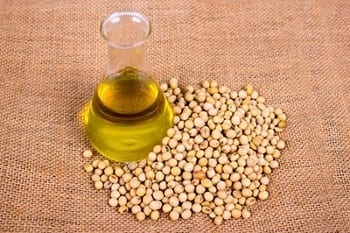Soybeans are the most versatile of commonly produced crops. Soy oil and other by-products have been used as ingredients in human and animal food, environmentally friendly bio-diesel fuel, bio-composites for construction, adhesives, carpet, upholstery, industrial lubricants, solvents and cleaners. Soy components are also being used in coolers, refrigerators, auto interiors and even footwear.
Whenever soy-based materials replace petroleum-based products, the sustainability of the environment improves notably. And users are finding that these products are also often better and less expensive.
Here are examples of three commercial soy-based products being used effectively:
1. GoJo Soy Green-Certified Hand Sanitizer Foam
GoJo Industries is a company whose mission is clearly aligned with sustainability and eco-friendly products. Their corporate commitment targets waste reduction, water use reduction, greenhouse gas reduction and environmental stewardship. With these objectives in mind, developing a foaming hand cleaner that is environmentally safe throughout its product life made sense.
In the case of GoJo’s Purell Foaming Green-Certified Hand Sanitizer, the product is serving two purposes as an eco-friendly product. Besides being 99.99% effective in destroying communicable germs, the hand cleanser is made from certified-green, natural ingredients including soy oil. Today these products are dispensed in a broad range of venues including hospitals, schools and universities, retail stores, factories, extended care facilities and a many of workplaces.
Gojo’s new bio-based Heavy-Duty Hand Sanitizer has also been recognized also by ECOLOGO for its reduced environmental impact formulation and as a USDA Certified Bio-Based Product. This contains no petroleum solvents and are non-toxic to marine animals.
2. Soy-Based Foam Insulation
Mentioned on the website of the TV program “This Old House”, the most airtight and innovative home insulation material is a spray foam produced from soybean sources. This product, a replacement for petroleum-based material, is the most sustainable and, over a long period. Several companies offer this new technology.
Disposal of traditional insulation materials is both expensive and hazardous, according to thomasnet.com. Soy-based insulation materials are becoming more widely used since they do not emit toxic gases and the insulation properties are at least as good as other materials. This insulation is resistant to mildew and mold while reducing pollen and dust particles. Other positive properties are that soy-based insulation does not contain ozone-depleting agents, blocks drafts and meets government standards for renewable products. Also there is no food-value interest for rodents and insects.
Soy-based insulation supports sustainability by saving energy and reducing the use of petrochemicals and their emissions. These soy-based foam alternatives have found their way into the automotive industry as well.
3. Meta-tec: Soy-Based Adhesives
Contractors have learned that builders and the eventually the building occupants have significant exposure to all the chemicals that have been used to produce flooring composites and the adhesives employed to secure them. These products that are placed underfoot have traditionally contained chemicals such as formaldehyde and other carcinogens. As a result, producers have begun to develop materials and adhesives using a soy-based foam instead of a concoction of harmful petrochemicals.
According to the United Soybean Board, one company, W.F. Taylor Company, has developed a technological solution named Meta-tec, a line of adhesive products using soy-based ingredients without harmful chemicals. The products bond well and are waterproof, anti-bacterial, low in VOCs and environmentally friendly. Lower in cost than the traditional epoxy, acrylics and urethane, Meta-tec is easy to use and cleans up easily after installation.
Meta-tec soy-based flooring products are recognized by the Greenguard Environmental Institute and their use is certified for LEED (Leadership in Energy and Environmental Design) credits.
Do you know of other soybean-based products that are out there? We’d love to hear about them in your comments below!

